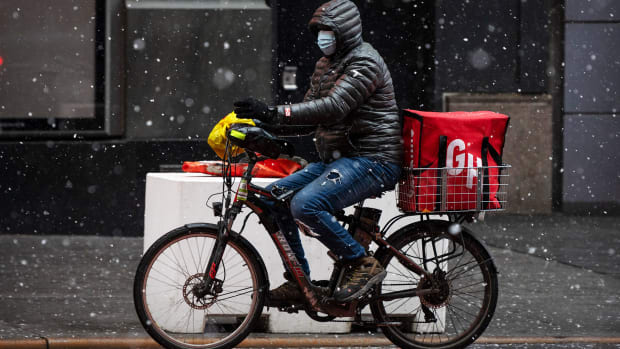TheStreet
A Grubhub spokesperson said the settlement was ‘in the best interest of our business.’
No one likes being lured in by the prospect of cheap burrito and $0 delivery only to start ringing up one’s order and find a $4 “service fee,” $2 “small order fee” and $1 “bag fee” tacked on to one’s final order.
The practice is common not just on food delivery apps but everything from plane, bus and amusement park ticket-booking platforms to cable bills and car rentals. Last fall, President Joe Biden promised to crack down on hidden ‘junk fees’ and ordered the Consumer Financial Protection Bureau to issue new guidance for banks in particular.
The push for disclosure of the total price of whatever it is one’s buying to be more transparent is already starting to take effect. Even before Biden’s initiative, Marriott (MAR) – Get Free Report became the first major hotel chain to agree to disclose the final cost of stays upfront amid threat of a lawsuit from the office of the Pennsylvania Attorney General.
A $3.5 Million Settlement For Grubhub
The latest company to land in hot water over hidden fees is food delivery platform Grubhub. Last week, the app agreed to pay $3.5 million to settle a consumer protection lawsuit accusing it of deceiving customers over the final cost of food orders.
Filed in the District of Columbia last March, the lawsuit took particular aim at Grubhub promising some customers in its subscription tier “free” delivery and then taking on service and small-order fees.
“Grubhub used every trick in the book to manipulate customers into paying far more than they owed,” D.C. Attorney General Karl Racine said in a statement of the lawsuit. “Grubhub’s hidden fees and misleading marketing tactics were designed to get the company an extra buck at the expense of D.C. residents — but we’re not letting them get away with it.”
When it comes to the $3.5 settlement, $2.7 million will go toward customers affected by the hidden fees (depending on frequency of platform use, one will get either $4.50, $7 or $10 deposited into one’s account as a spending credit) while the remaining $800,000 is a civil penalty paid to the district.
The settlement also requires Grubhub to “significantly change its business practices” so that any additional fees are seen not just at check-out but when customers are picking out dishes.
Alexi Rosenfeld/Getty Images
The Fight Against Hidden Fees Is Just Beginning
At least for orders made in D.C., taxes and service fees also need to be clearly itemized so that customers can see upfront how much it costs them to use the platform instead of picking it up themselves. The platform also needs to stop advertising “free delivery” to Grubhub+ subscribers if it only applies to certain restaurants or orders.
Back in November, Grubhub agreed to a much smaller $125,000 settlement with the Pennsylvania Office of Attorney General over similar accusations.
While a Grubhub spokesperson has been telling media outlets that the “matter is now resolved” because “settling this lawsuit is in the best interest of our business,” the large settlement for D.C. users is likely to ignite similar accusations across the industry as both regulator and public anger over extra fees reaches a head during a looming recession.
“These so called ‘junk fees’ are not just an irritant — they can weaken market competition, raise costs for consumers and businesses, and hit the most vulnerable Americans the hardest,” Biden’s office said at the time of its October crackdown.
Author Profile
Latest entries
 ScienceSeptember 19, 2024Deadly snail venom could make diabetes medicines better
ScienceSeptember 19, 2024Deadly snail venom could make diabetes medicines better HeadlinesSeptember 19, 2024Video shows former Dodgers pitcher Julio Urías's domestic violence incident outside MLS match in 2023
HeadlinesSeptember 19, 2024Video shows former Dodgers pitcher Julio Urías's domestic violence incident outside MLS match in 2023 HeadlinesSeptember 19, 2024This New York City pizza has been crowned No. 1 in world, here's why
HeadlinesSeptember 19, 2024This New York City pizza has been crowned No. 1 in world, here's why HeadlinesSeptember 19, 2024North Korea launches fresh wave of trash balloons toward South Korea
HeadlinesSeptember 19, 2024North Korea launches fresh wave of trash balloons toward South Korea

